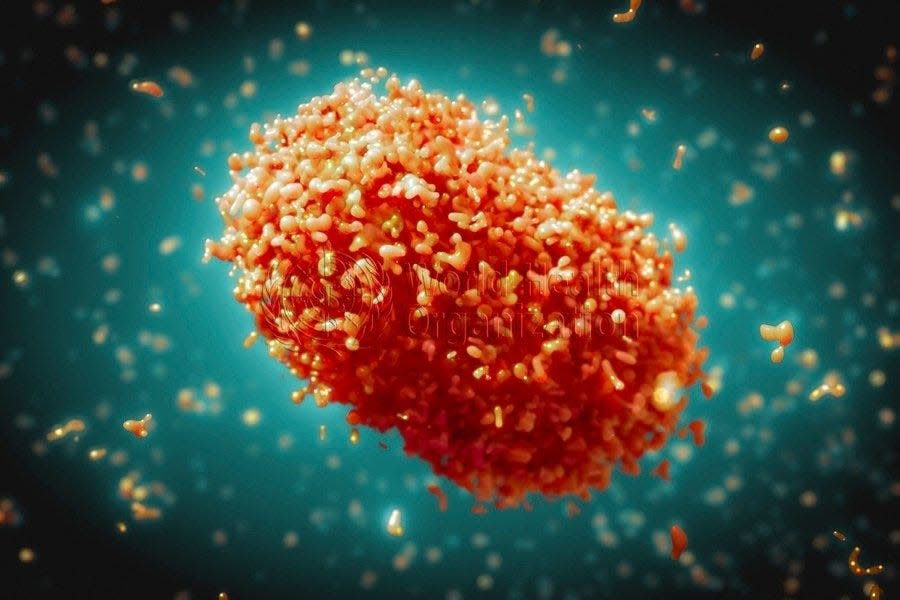'Risk is very low.' Doctors say monkeypox in NH is concerning, but not cause for panic
PORTSMOUTH — Monkeypox is in the news right now, but health care experts say the big takeaway is that this is a disease that is usually self resolving, with a low transmission rate — and it is not the next pandemic.
"The most important thing to keep in mind is that this is still a rare infection in the United States," said Dr. Gretchen Volpe, an infectious disease specialist at York Hospital. "This is a viral infection typically not endemic to the US. In the past, people who contract this have traveled to an endemic area. So, while this is unusual, you are unlikely to acquire the virus without contact with an infected person."

Last week, the New Hampshire Department of Health and Human Services identified the first probable case of monkeypox in the New Hampshire. The patient is a resident of Rockingham County.
The New Hampshire Public Health Laboratories conducted the initial testing that identified the case and the U.S. Centers for Disease Control and Prevention confirmed it.
“While this is a concerning development, the risk to the general public is very low,” said Dr. Jonathan Ballard, DHHS chief medical officer. “We are investigating this situation to determine whether additional people may have been exposed.”
More: Exeter Hospital signs deal with Beth Israel Lahey: Here's what must happen next

Monkeypox is a rare disease caused by the monkeypox virus, which belongs to the same group of viruses as smallpox. Transmission of monkeypox requires close interaction with a symptomatic person. Brief interactions do not appear to be high risk; transmission has usually involved close physical or intimate contact or health care examinations conducted not using appropriate protective equipment.
Martha Wassell, director of infection prevention at Wentworth-Douglass Hospital, said the risk of contracting monkeypox through casual contact is extremely low.
"Skin to skin contact is necessary," she said. "An infected person will have flu-like symptoms at first, and then develop a centrifugal rash. It is not a fatal disease and it usually goes away on its own, with no treatment."
"It is a serious condition, but it is not smallpox serious," said Dr. David Itkin, a Seacoast area infectious disease provider. "Monkeypox has been primarily localized to Africa, but this latest outbreak is centered in Europe. About 6,000 cases have been reported so far, and as of July 1, there are 460 cases in the US, and one case here in Rockingham County."
Unlike COVID, monkeypox is not a respiratory disease, not spread through droplets. Itkin said it transmits through direct skin contact.
Reports have indicated that monkeypox is hitting the gay community the hardest, but health care officials say it is a virus and can strike anyone.
"That means touching skin that has viable virus," he said. "There has been some reporting that sexual contact between men might be a risk factor. It would be prejudicial to assume this is a sexually transmitted issue with any particular group. There is no knowledge that it is spread through sex, blood or drug use."
Volpe said people who are traveling Internationally should be aware of the risk and take precautions.
More: Do regular tick checks: Seacoast doctors share tips to avoid ticks and Lyme disease
"There is an element of awareness now for health care providers, so recognizing the risk and the symptoms should be enough," she said. "If you think you have been exposed, you should notify your health care provider for instructions. Typically quarantine is advised, something we are all used to by now with COVID."
Itkin said monkeypox comes from external markers, from contact with the rash or lesions that are part of the disease.
"The rash is similar to that of chicken pox, zoster or smallpox in appearance," he said. "It most commonly appears distally, on the hands, feet and sometimes the face. It can be oral or genital."
According to the CDC, initial symptoms typically include fever, headache, exhaustion, muscle aches, sore throat, cough, and swollen lymph nodes. A few days after the start of these symptoms, a skin rash or skin spots appear that change over time. People with monkeypox are contagious until all skin lesions have scabbed over and fallen off a person’s skin. The illness usually lasts for two to four weeks. Symptoms are usually mild, but in rare cases a more severe illness can occur that might require hospitalization.
"People are considered contagious until the rash has healed, dried," Itkin said. "There is a PCR test for diagnosis and an infected person should quarantine at home until healed. There is a vaccine that is attenuated, a live virus but one that does not replicate well."
Wassell said there is an antiviral medication, but it is being used for people who are at a higher risk.
"The only real challenge to public heath is the incubation period," said Wassell. "That can be 5 to 21 days, so the chance of exposing others is high during that time."
Any person with a new skin rash or skin lesions concerned about monkeypox, especially if accompanied by other monkeypox symptoms, should talk to their health care provider. Testing should be considered if the skin rash and other symptoms are present.
More information about the monkeypox outbreak is available on the CDC’s Monkeypox Outbreak 2022 website or the NHDHHS Monkeypox webpage.
This article originally appeared on Fosters Daily Democrat: Doctors say monkeypox in NH is concerning, but not cause for panic

